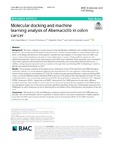Mostrar o rexistro simple do ítem
Molecular Docking and Machine Learning Analysis of Abemaciclib in Colon Cancer
| dc.contributor.author | Liñares Blanco, Jose | |
| dc.contributor.author | Munteanu, Cristian-Robert | |
| dc.contributor.author | Pazos, A. | |
| dc.contributor.author | Fernández-Lozano, Carlos | |
| dc.date.accessioned | 2020-07-29T14:12:31Z | |
| dc.date.available | 2020-07-29T14:12:31Z | |
| dc.date.issued | 2020-07-08 | |
| dc.identifier.citation | Liñares-Blanco, J., Munteanu, C.R., Pazos, A. et al. Molecular docking and machine learning analysis of Abemaciclib in colon cancer. BMC Mol and Cell Biol 21, 52 (2020). https://doi.org/10.1186/s12860-020-00295-w | es_ES |
| dc.identifier.issn | 2661-8850 | |
| dc.identifier.uri | http://hdl.handle.net/2183/26061 | |
| dc.description.abstract | [Abstract] Background - The main challenge in cancer research is the identification of different omic variables that present a prognostic value and personalised diagnosis for each tumour. The fact that the diagnosis is personalised opens the doors to the design and discovery of new specific treatments for each patient. In this context, this work offers new ways to reuse existing databases and work to create added value in research. Three published signatures with significante prognostic value in Colon Adenocarcinoma (COAD) were indentified. These signatures were combined in a new meta-signature and validated with main Machine Learning (ML) and conventional statistical techniques. In addition, a drug repurposing experiment was carried out through Molecular Docking (MD) methodology in order to identify new potential treatments in COAD. Results - The prognostic potential of the signature was validated by means of ML algorithms and differential gene expression analysis. The results obtained supported the possibility that this meta-signature could harbor genes of interest for the prognosis and treatment of COAD. We studied drug repurposing following a molecular docking (MD) analysis, where the different protein data bank (PDB) structures of the genes of the meta-signature (in total 155) were confronted with 81 anti-cancer drugs approved by the FDA. We observed four interactions of interest: GLTP - Nilotinib, PTPRN - Venetoclax, VEGFA - Venetoclax and FABP6 - Abemaciclib. The FABP6 gene and its role within different metabolic pathways were studied in tumour and normal tissue and we observed the capability of the FABP6 gene to be a therapeutic target. Our in silico results showed a significant specificity of the union of the protein products of the FABP6 gene as well as the known action of Abemaciclib as an inhibitor of the CDK4/6 protein and therefore, of the cell cycle. Conclusions - The results of our ML and differential expression experiments have first shown the FABP6 gene as a possible new cancer biomarker due to its specificity in colonic tumour tissue and no expression in healthy adjacent tissue. Next, the MD analysis showed that the drug Abemaciclib characteristic affinity for the different protein structures of the FABP6 gene. Therefore, in silico experiments have shown a new opportunity that should be validated experimentally, thus helping to reduce the cost and speed of drug screening. For these reasons, we propose the validation of the drug Abemaciclib for the treatment of colon cancer. | es_ES |
| dc.description.sponsorship | This work was supported by the “Collaborative Project in Genomic Data Integration (CICLOGEN)” PI17/01826 funded by the Carlos III Health Institute from the Spanish National plan for Scientific and Technical Research and Innovation 2013–2016 and the European Regional Development Funds (FEDER)—“A way to build Europe.” and the General Directorate of Culture, Education and University Management of Xunta de Galicia (Ref. ED431G/01, ED431D 2017/16), the “Galician Network for Colorectal Cancer Research” (Ref. ED431D 2017/23) and Competitive Reference Groups (Ref. ED431C 2018/49). The calculations were performed on resources provided by the Spanish Ministry of Economy and Competitiveness via funding of the unique installation BIOCAI (UNLC08-1E-002, UNLC13-13-3503) and the European Regional Development Funds (FEDER). The funding body did not have a role in the experimental design; data collection, analysis and interpretation; and writing of this manuscript | es_ES |
| dc.description.sponsorship | Xunta de Galicia; ED431G/01 | es_ES |
| dc.description.sponsorship | Xunta de Galicia; ED431D 2017/16 | es_ES |
| dc.description.sponsorship | Xunta de Galicia; ED431D 2017/23 | es_ES |
| dc.description.sponsorship | Xunta de Galicia; ED431C 2018/49 | es_ES |
| dc.language.iso | eng | es_ES |
| dc.publisher | BioMed Central Ltd. | es_ES |
| dc.relation | info:eu-repo/grantAgreement/ISCIII/Plan Estatal de Investigación Científica y Técnica y de Innovación 2013–2016/PI17%2F01826/ES/PROYECTO COLABORATIVO DE INTEGRACION DE DATOS GENOMICOS (CICLOGEN). TECNICAS DE DATA MINING Y DOCKING MOLECULAR PARA ANALISIS DE DATOS INTEGRATIVOS EN CANCER DE COLON/ | |
| dc.relation | info:eu-repo/grantAgreement/MEC/Plan Nacional de I+D+i 2008-2011/UNLC08-1E-002/ES/Infraestructura computacional para la Red Gallega de Bioinformática | |
| dc.relation | info:eu-repo/grantAgreement/MINECO/Plan Estatal de Investigación Científica y Técnica y de Innovación 2013-2016/UNLC13-1E-2503/ES/Plataforma HPC-PLUS para aplicaciones biomédicas | |
| dc.relation.uri | https://doi.org/10.1186/s12860-020-00295-w | es_ES |
| dc.rights | Atribución 4.0 Internacional | es_ES |
| dc.rights.uri | http://creativecommons.org/licenses/by/4.0/ | * |
| dc.subject | Machine learning | es_ES |
| dc.subject | Molecular docking | es_ES |
| dc.subject | Colon cancer | es_ES |
| dc.subject | Prognosis | es_ES |
| dc.subject | Drug repurposing | es_ES |
| dc.subject | FABP6 | es_ES |
| dc.subject | Abemaciclib | es_ES |
| dc.subject | TCGA | es_ES |
| dc.title | Molecular Docking and Machine Learning Analysis of Abemaciclib in Colon Cancer | es_ES |
| dc.type | info:eu-repo/semantics/article | es_ES |
| dc.rights.access | info:eu-repo/semantics/openAccess | es_ES |
| UDC.journalTitle | BMC Molecular and Cell Biology | es_ES |
| UDC.volume | 21 | es_ES |
Ficheiros no ítem
Este ítem aparece na(s) seguinte(s) colección(s)
-
GI-RNASA - Artigos [196]






